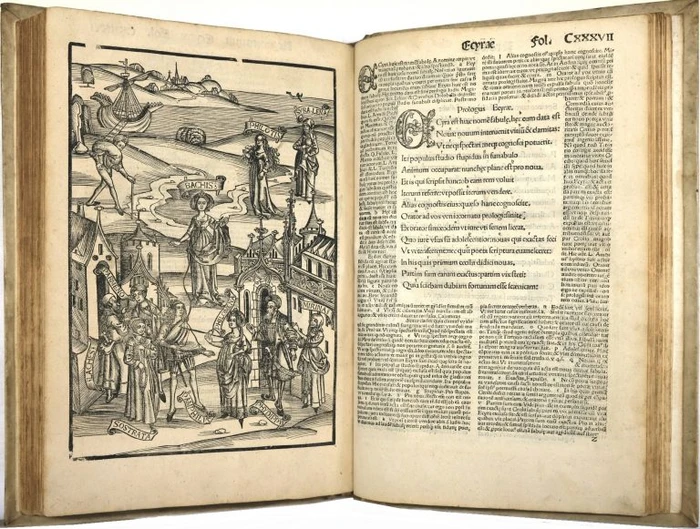From the Rare Book Collection: Terentius Comico Carmine
Selected from our Rare Book Collection is this beautiful 1503 illustrated edition of Terentius Comico Carmine, a collection of comedies by the Roman playwright Publius Terentius Afer.

Publius Terentius Afer (better known simply as ‘Terence’) was born into slavery in North Africa around 185 BC and was sold as a child to a Roman senator who took him back to Italy. His owner educated him and became so impressed with his wit and intelligence that he granted him his freedom. Terence went on to write six plays based on the Greek Attic style of comedy, all of which survive to the present day. After the collapse of the Roman Empire, his plays survived as hand-written manuscripts which were preserved in monasteries for hundreds of years through the Dark Ages and into Medieval period. Following Johannes Gutenberg’s invention of the movable-type printing press in the mid 15th century, Terence’s works were among the first plays to be printed in Europe. This copy was published by Johann Grüninger in Strasbourg at the very start of the 16th Century. Though today part of France, at the time the city was principally German speaking and was the centre of the early European printing industry.
The protestant religious reformer Martin Luther became a great admirer of Terence and frequently mentioned his insights into human nature in his own writing. One famous Terence quote which has inspired many is Homo sum, humani nihil a me alienum puto, or, “I am human, so nothing human is alien to me”. Luther also suggested that his plays could be useful for teaching morals and ethics to youth. What makes this somewhat surprising is that Luther was known for his socially conservative views but Terence’s work is often bawdy with no shortage of risqué content. His work Hecyra (aka The Mother in Law) of which three pages are shown here, is a good example of this. The play follows a young man who falls in love with a prostitute and includes drunken debauchery, sex, domestic violence, and a farcical case of mistaken identity which wouldn’t be out of place in a Christmas pantomime…but everything works out happily in the end.
Amusingly, the first two attempted performances of the play during the Classical period both ended somewhat disastrously. The first was in 165 BC when shortly before it was supposed to begin, a rumor spread that a tightrope-walker and boxers were about to perform and the theatre was suddenly swamped by people expecting to see circus acts. The second in 160 BC was cancelled after the theater was again overrun, this time by drunk gladiator supporters. It was finally performed successfully on its third attempt later the same year. Another curiosity is that it was long thought that a musical phrase which accompanies a single line of the text in Hecyra was the only remaining written description of the entire body of ancient Roman music. However, its authenticity is now disputed and it may have had 10th Century origins.
Terence’s newfound popularity during the Renaissance followed the spread of the reformation to England and his work had a notable influence on Shakespeare nearly a century after the publication of this edition. One intriguing thought is the possibility that another copy of this edition could have ended up in Shakespeare’s own library. This now-500+ year old volume came into our collection after being gifted to the institution shortly after the municipal library was founded in 1893. At some point the volume was rebound in vellum, a hard-wearing cream-colored covering made from calf skin which (unlike leather), does not go through a tanning process but is stretched and dried without significant chemical treatment. With the Central Library currently closed, the book is being carefully stored in a custom-made acid-free enclosure in a temperature and humidity controlled room at the Wellington City Archives.